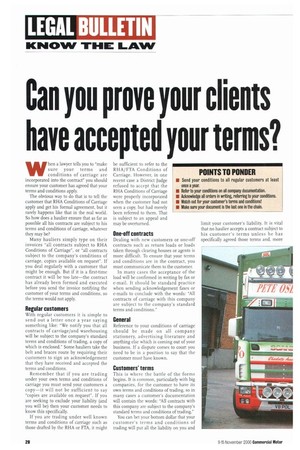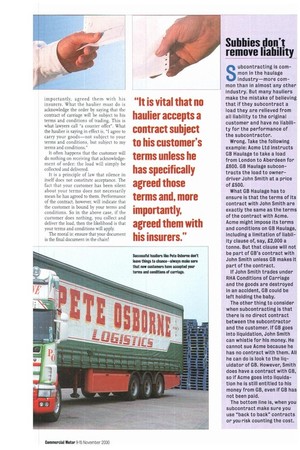W hen a lawyer tells you to "make sure your terms
Page 30

Page 31

If you've noticed an error in this article please click here to report it so we can fix it.
and conditions of carriage are incorporated into the contract" you should ensure your customer has agreed that your terms and conditions apply.
The obvious way to do that is to tell the customer that RHA Conditions of Carriage apply and get his formal agreement, but it rarely happens like that in the real world. So how does a haulier ensure that as far as possible all his contracts are subject to his terms and conditions of carriage, whatever they may be?
Many hauliers simply type on their invoices "all contracts subject to RHA Conditions of Carriage", or "all contracts subject to the company's conditions of carriage, copies available on request". If you deal regularly with a customer that might be enough. But if it is a first-time contract it will be too late—the contract has already been formed and executed before you send the invoice notifying the customer of your terms and conditions, so the terms would not apply.
Regular customers With regular customers it is simple to send out a letter once a year saying something like: "We notify you that all contracts of carriage/and warehousing will be subject to the company's standard terms and conditions of trading, a copy of which is enclosed." Some hauliers take the belt and braces route by requiring their customers to sign an acknowledgement that they have received and accepted the terms and conditions.
Remember that if you are trading under your own terms and conditions of carriage you must send your customers a copy—it will not be sufficient to say "copies are available on request". If you are seeking to exclude your liability {and you will be) then your customer needs to know this specifically.
If you are trading under well known terms and conditions of carriage such as those drafted by the RHA or FTA, it might
be sufficient to refer to the RHA/FTA Conditions of Carriage. However, in one recent case a District judge refused to accept that the RHA Conditions of Carriage were properly incorporated when the customer had not seen a copy, but had merely been referred to them. That is subject to an appeal and may be overturned.
One-off contracts
Dealing with new customers or one-off contracts such as return loads or loads taken through clearing houses or agents is more difficult. To ensure that your terms and conditions are in the contract, you must communicate them to the customer.
In many cases the acceptance of the load will be confirmed in writing by fax or e-mail. It should be standard practice when sending acknowledgement faxes or e-mails to conclude with the words: "All contracts of carriage with this company are subject to the company's standard terms and conditions."
General Reference to your conditions of carriage should be made on all company stationery, advertising literature and anything else which is coming out of your business. If a dispute comes to court you need to be in a position to say that the customer must have known.
Customers' terms This is where the battle of the forms begins. It is common, particularly with big companies, for the customer to have its own terms and conditions of trading, so in many cases a customer's documentation will contain the words: "All contracts with this company are subject to the company's standard terms and conditions of trading."
You can bet your bottom dollar that your customer's terms and conditions of trading will put all the liability on you and limit your customer's liability. It is vital that no haulier accepts a contract subject to his customer's terms unless he has specifically agreed those terms and, more importantly, agreed them with his insurers. What the haulier must do is acknowledge the order by saying that the contract of carriage will be subject to his terms and conditions of trading. This is what lawyers call "a counter offer". What the haulier is saying in effect is, "I agree to carry your goods—not subject to your terms and conditions, but subject to my terms and conditions."
It often happens that the customer will do nothing on receiving that acknowledgement of order: the load will simply be collected and delivered.
It is a principle of law that silence in itself does not constitute acceptance. The fact that your customer has been silent about your terms does not necessarily mean he has agreed to them. Performance of the contract, however, will indicate that the customer is bound by your terms and conditions. So in the above case, if the customer does nothing, you collect and deliver the load, then the likelihood is that your terms and conditions will apply.
The moral is: ensure that your document is the final document in the chain!




































































































